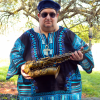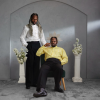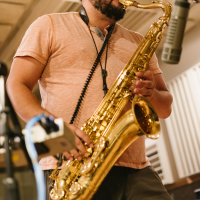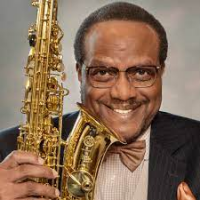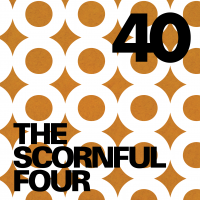Home » Jazz Musicians » Sonny Stitt
Sonny Stitt
Edward "Sonny" Stitt was a quintessential saxophonist of the bebop idiom. He was also one of the most prolific saxophonists, recording over 100 records in his lifetime. He was nicknamed the "Lone Wolf" by jazz critic Dan Morgenstern, due to his relentless touring and his devotion to jazz.
Stitt was born in Boston, Massachusetts, and grew up in Saginaw, Michigan. Stitt had a musical background; his father taught music, his brother was a classically trained pianist, and his mother was a piano teacher. His earliest recordings were from 1945, with Stan Getz and Dizzy Gillespie. He had also experienced playing in some swing bands, though he mainly played in bop bands. Stitt featured in Tiny Bradshaw's big band in the early forties.
Stitt played alto saxophone in Billy Eckstine's big band alongside future bop pioneers Dexter Gordon and Gene Ammons from 1945 until 1949, when he started to play tenor saxophone more frequently. Later on, he notably played with Gene Ammons and Bud Powell. Stitt spent time in a Lexington prison between 1948-49 on account of selling narcotics.
Stitt, when playing tenor saxophone, seemed to break free from some of the criticism that he was apeing jazz genius Charlie Parker's style. When alto saxophonist Gene Quill was criticised for playing too similar to Parker once by a jazz writer he retorted, "You try imitating Charlie Parker!" Indeed, Stitt began to develop a far more distinctive sound on tenor. He played with other bop musicians Bud Powell and Eddie "Lockjaw" Davis, a fellow tenor with a distinctly tough tone in comparison to Stitt, in the 1950s and recorded several albums for the burgeoning Prestige Records label as well as for Argo, Verve and Roost. Stitt's playing is said to be at its zenith on these now rare records. Stitt experimented with Afro-Cuban jazz in the late 1950s, and the results can be heard on his recordings for Roost and Verve, on which he teamed up with Thad Jones and Chick Corea for Latin versions of such standards as "Autumn Leaves."
Stitt joined Miles Davis briefly in 1960, and his sole performance with the 1960 quintet is on the record Live at Stockholm, which featured Wynton Kelly, Jimmy Cobb and Paul Chambers. However, Miles fired him due to the excessive drinking habit he had developed, and replaced him with fellow tenor saxophonist Hank Mobley. Stitt, later in the 1960s paid homage to one of his main influences, Charlie Parker, on the seminal cut "Stitt Plays Bird", which features Jim Hall on guitar. He recorded a number of memorable records with his friend and fellow saxophonist Gene Ammons. The records recorded by these two saxophonists are regarded by many as some of both Ammons and Stitt's best work, thus the Ammons/Stitt partnership went down in posterity of the best duelling partnerships in jazz, alongside Zoot Sims & Al Cohn, and Johnny Griffin with Eddie "Lockjaw" Davis. Stitt would venture into soul jazz, and he recorded with fellow tenor great Booker Ervin in 1964 on the enjoyable Soul People album. Stitt would also record with Duke Ellington alumnus Paul Gonsalves during the 1960's.
Read moreTags
Sonny Sitt, Kris Davis, Rufus Reid

by David Brown
This week, a series of mini-sets featuring Sonny Sitt, Tommy Flanagan, Esperanza Spalding, Harold Land, Kris Davis and Rufus Reid. Welcome friends and neighbors to The Jazz Continuum. Old, new, in, out... wherever the music takes us. Each week, we will explore the elements of jazz from a historical perspective.Playlist Thelonious Monk “Esistrophy (Theme)" from Live at the It Club-Complete (Columbia) 01:30 Roberto Magris,Sam Reed “Jungle Strut" from Ready for Reed (JMood) 08:43 Sonny Stitt “Tune-Up" from Tune-Up! ...
Continue ReadingSonny Stitt, Eugene Chadbourne and More

by Jerome Wilson
This episode covers a broad range of jazz from Sonny Stitt in full live cry to Eugene Chadbourne playing Eric Dolphy. In between those poles are Don Byron, Dizzy Gillespie, Sara Caswell, and a lot more. Playlist Henry Threadgill Sextett “I Can't Wait Till I Get Home" from The Complete Novus & Columbia Recordings of Henry Threadgill & Air (Mosaic) 00:00 Coleman Hawkins “I'm Beginning to See the Light" from Swingville Original Jazz Classics Sampler (Swingville) 00:58 Dizzy ...
Continue ReadingSonny Stitt: Boppin’ in Baltimore Live at the Left Bank

by Alberto Bazzurro
L'11 novembre 1973 alla Famous Ballroom di Baltimora il quartetto di Sonny Stitt, fresco reduce dai fasti dei Giants of Jazz (Gillespie, Monk, Winding, Blakey, McKibbon) e certamente in stato di grazia (non aveva del resto ancora cinquant'anni pur essendo già un veterano, per qualcuno addirittura un sorpassato), tenne un concerto ricco di fuoco e invenzioni a getto continuo che oggi, grazie a Jazz Detective, trova posto in un doppio album (CD o LP) comprensivo di ampio libretto di accompagnamento ...
Continue ReadingThe Early Years of Sonny Stitt in Saginaw, Michigan

by Dustin Mallory
As one of most recorded saxophonists of his generation, Sonny Stitt made more than 100 albums under his own name. He also performed as a sideman with the likes of Miles Davis, Dizzy Gillespie, and Art Blakey. Despite the breadth of recorded work he left behind, Sonny Stitt's upbringing in Saginaw, Michigan is less well-documented. The basic facts of his birth have been widely circulated: Edward “Sonny" Stitt was born Edward Boatner Jr., the son of a Massachusetts concert singer/composer ...
Continue ReadingSonny Stitt: Don't Call Me Bird!

by Samuel Chell
Absolute Distribution, a Spanish consortium of labels, has done it again, following up last year's welcome single-disc reissue (at least outside the U.S.) of Stitt's 1970s Cobblestone sessions, Tune-Up! + Constellation, with two 1959 West Coast dates for Verve featuring Stitt on alto with a crack California rhythm section. Even though a first-time reissue, the disc is scarce domestically, but the musical content and production values make it well worth the search. A listener familiar with Stitt's tenor duel with ...
Continue ReadingThe Prodigious and Prolific Sonny Stitt: 16 New Releases for 2007 (and still counting!)

by Samuel Chell
“You can't do no more than has already been done. Remember a man named Art Tatum; now, who can play any more than that? ...You ain't supposed to play over people's heads. You're trying to give a message to people, and make it as simple as possible for the average man." The quote is by a paradoxical reactionary who, like Tatum, could improvise on a tune and make you think you'd heard it. Only after 20-30 more listenings ...
Continue ReadingSonny Stitt: Quadromania/One O'Clock Jump

by Samuel Chell
Sonny Stitt Quadromania: One O'Clock Jump Membran Records 2006
Regarded by many musicians as the prototypal, or “most perfect," saxophonist, Sonny Stitt recorded some 150 sessions under his own name. These four discs in German company Membran's Quadromania series will, with the possible exception of some recorded tenor battles 1950-52 under Gene Ammons' name, take care of most listeners' needs from late 1946 to early 1954. There are close to four hours of music ...
Continue ReadingPerfection: Sonny Stitt - Goin' Down Slow
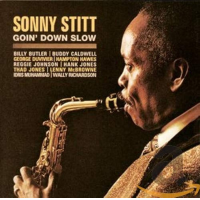
Source:
JazzWax by Marc Myers
Today, I'm serving up two tracks for this week's Perfection entry, because as anyone who bought Sonny Stitt's LP Goin' Down Slow in 1972 knows, it's impossible to listen to the first without the second. The two featured tracks are Stitt's Miss Ann, Lisa, Sue and Sadie and Where Is Love by Lionel Bart from Oliver! The songs were recorded by Stitt in February 1972. Produced by Ozzie Cadena for Prestige, the first song featured Thad Jones (tp), Sonny Stitt (as), ...
read more
Backgrounder: Sonny Stitt's Night Crawler

Source:
JazzWax by Marc Myers
When I was collecting Sonny Stitt albums as a kid in the early 1970s, my purchases divided into three categories: not bad, meh and perfection. Back then, there was no internet. Instead, I listened religiously to jazz FM radio stations and entered favorites in a small notebook that fit in my back pocket. Everyone I knew had one. Then you hunted for the ones on your list and took chances on others that either came highly recommended or looked good. ...
read more
Backgrounder: Sonny Stitt - Tune-Up!

Source:
JazzWax by Marc Myers
Perhaps the high points of Joe Fields's Cobblestone label were a pair of albums by Sonny Stitt released in 1972—Tune-Up! and Constellation. Both were produced by Don Schlitten. On Tunre-Up!, Stitt played alto and tenor saxophone and was accompanied by Barry Harris on piano, Sam Jones on bass and Alan Dawson on drums. What made this album (and Constellation) special was Stitt's commanding speed, clean lines and bebop fluidity. I remember buying both at Sam Goody in Manhattan that year ...
read more
Backgrounder: Sensual Sound of Sonny Stitt

Source:
JazzWax by Marc Myers
On March 6 and 7 of 1961, arranger-conductor Ralph Burns assembled a top orchestra in New York, a rhythm section and saxophonist Sonny Stitt for an album that would be called The Sensual Sound of Sonny Stitt. I'm not sure what month in 1961 producer Creed Taylor arrived at Verve to become the label's recording chief, but this one may have already been in the can, since Creed's signature isn't on the back cover. Stitt plays alto and tenor saxophones, ...
read more
Sonny Stitt, Shirley Scott and Walter Bishop Jr.

Source:
JazzWax by Marc Myers
Baltimore's Left Bank Jazz Society was formed in 1964. It's claim to fame was promoting more than 800 jazz concerts at the city's Famous Ballroom at 1717 North Charles Street. Nearly every major jazz artist who came through the city was booked by the Society into the Ballroom, its interior modeled after New York's Roseland Ballroom. Most of the jazz shows initially were held on Sundays at 5 p.m., probably because it was the only evening when the space wasn't ...
read more
Backgrounder: Sonny Stitt Plays

Source:
JazzWax by Marc Myers
Some of the finest blowing by saxophonist Sonny Stitt can be found on Roost Records. Several years back, Mosaic released a box set of Stitt's complete Roost recordings, and it's still one of my favorites. Among the albums in that box was Sonny Stitt Plays. Recorded in December 1955, the album featured Sonny Stitt on alto and tenor saxophones, Hank Jones on piano, Freddie Green on guitar, Wendell Marshall on bass and Shadow Wilson on drums. As part of my ...
read more
Sonny Stitt and Oscar Peterson

Source:
JazzWax by Marc Myers
I love Oscar Peterson's playing. I'm just never crazy about his tempos. As the leader on recording sessions with his trio or quartet, Peterson tended to take songs excruciatingly slow or erratically fast. I'm not sure why Verve and Pablo producer Norman Granz never bothered to mention this to him over a dinner or from the studio control booth. Only a handful of Peterson leadership albums are just right throughout. A Jazz Portrait of Frank Sinatra (1959), West Side Story ...
read more
Sonny Stitt: What's New!!!

Source:
JazzWax by Marc Myers
Jazz still has many albums that are like that movie where the bell rings and the person at the door is the family's child who disappeared 20 years ago. During the digital revolution, not every album made the jump to CD or downloads. Some simply went out of print on vinyl and were never reissued. Then, when your LPs went into storage as you converted to iTunes libraries, external hard drives and Spotify, you found yourself cut off from your ...
read more
Sonny Stitt: Soul Shack

Source:
JazzWax by Marc Myers
Sonny Stitt made dozens of records in the 1960s. Many were very good, and some were spotty—as is to be expected when an artist is that prolific. But there also were knockouts—albums on which Stitt was perfectly paced and at the very top of his game on alto and tenor saxophones. One such outing where Stitt offers a penetrating, sweet tone and superlative lines was Soul Shack, recorded in September 1963 for Prestige. Soul Shack is an album of mostly ...
read more
Sonny Stitt: Varitone Redux

Source:
JazzWax by Marc Myers
By the end of 1964, the saxophone's fate was pretty much sealed. For more than 30 years, the reed instrument along with the trumpet had been played by superstar jazz performers who typically led groups or were at least main soloists. But with pop-rock's arrival in the early 1960s, the Beatles' euphoric invasion in '64 and Bob Dylan's electric conversion in mid-'65, the saxophone was fast taking a backseat to the electric guitar. Panicked, the Selmer Co. began experimenting with ...
read more




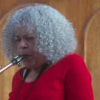









.jpg)


